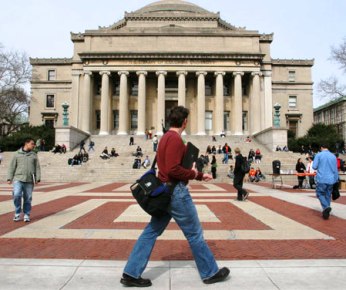Ahh, New York’s Columbia University… where the walls are ivy, the shirts are Ralph Lauren and the pedigree (alumni) includes five Founding Fathers, nine Supreme Court Justices, twenty-nine heads of state and three U.S. Presidents. It’s also where the Pulitzer Prize acknowledging excellence in journalism is administered each year.

But wait, what’s this?
As The New York Times reported (Dec. 3, 2006) “…Columbia University continues to grapple with allegations of cheating on a final exam in a journalism ethics course…The topic: What should a newspaper’s executive editor do after receiving ‘a tip from a credible source that one or more unspecified articles in recent editions of the newspaper contain fabricated material’?”
The test was an open-book, take home essay exam where students had to log-on to a computer, sign-in and were given 90 minutes to respond.
So, how do you cheat on an open-book, essay test?
“…at least one student,” the Times writes, “who had taken the exam reportedly offered to tell at least one other student who had not yet taken it what the essay questions were, which would give the second student extra time to prepare before the clock started ticking. A student who was approached reportedly notified a teaching assistant…”
In my book, What Do You Stand For?, Stephen Potts, the former director of the Office of Government Ethics in Washington, D.C. contributed a story about the influence of a university professor and his ‘integrity’ test.
“In 1948, Vanderbilt University’s Dean of Students, Madison Sarratt, taught a freshman algebra course. On the day our class assembled for our first major exam, we found the exam questions face down on our desks. Dean Sarratt stood at ease in front of his desk. After we were seated, he said, ‘Today you are going to take two tests – one in algebra and one in integrity. I hope that you pass both. But if you must fail one, let it be algebra. You may now begin.’
“He turned and left the room. My fellow students and I briefly scanned each other and then went to work.
“We all passed the integrity test. Dean Sarratt’s strength of character permeated that room. I’m sure everyone shared my feeling that we had to vindicate his faith in us.”
After spending an hour searching the internet, I could not find out when or if the cheating scandal at Columbia had been resolved.
If, however, I had been advising the Columbia teacher, I would have recommended that considering the suspicious nature of the allegations, the teacher should retest everyone by way of having a new essay test taken with all students in a classroom. The question would be this:
You’ve already taken an online essay test for journalism. In talking to other students from the class you overhear one offer to help others by giving the question in advance. Do you report the incident, as well as the name of the student who made the offer, or do you remain silent? In your response, explain the conflict between loyalty and honesty and why you chose one over the other.
Comments










